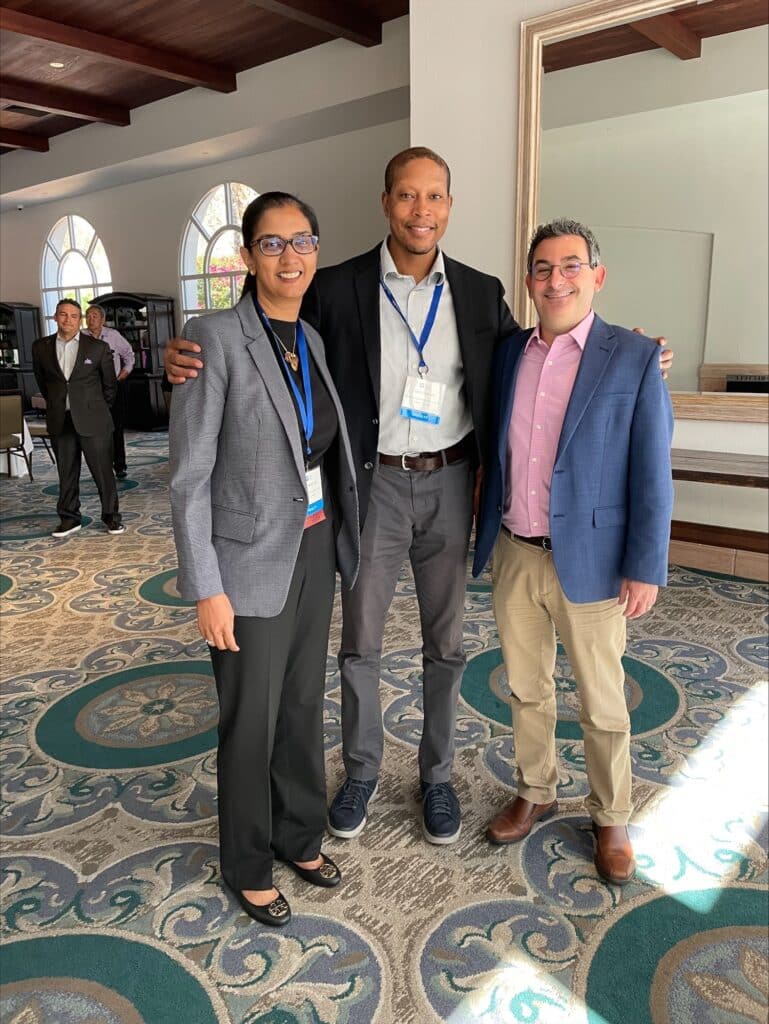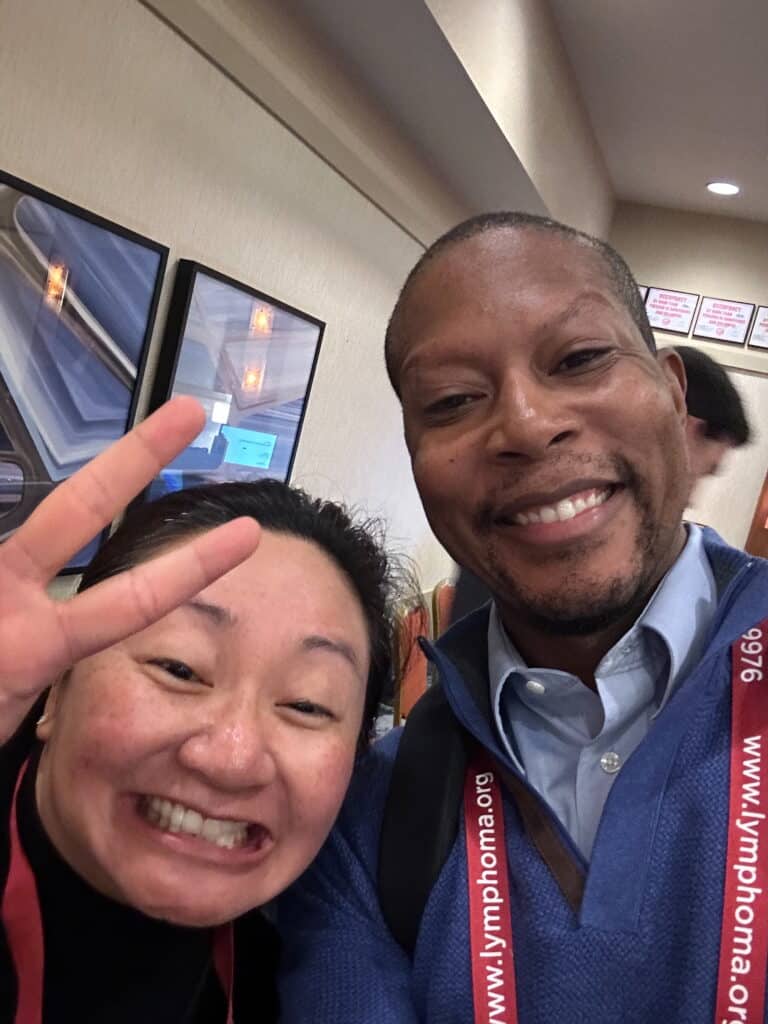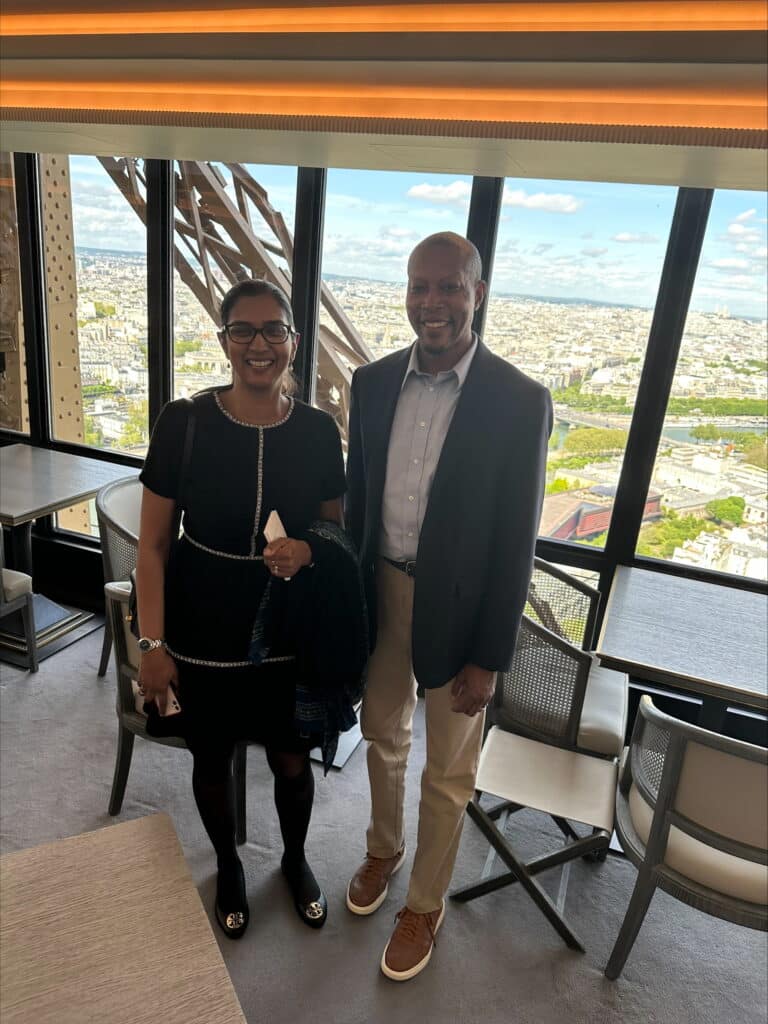From Personal Loss to Professional Passion: A Researcher’s Dedication to Transforming Patients’ Lives

When Tycel Phillips, MD, of City of Hope, was a young child growing up in Chicago, his grandmother gave him an anatomy book as a gift. And with that one gesture, a seed was planted.
“My grandmother may have had some preordained plan for me to go into medicine,” Dr. Phillips jested. “But needless to say, that’s not exactly why I chose my career path. As a child, I was always interested in reading and science.”
In high school, Dr. Phillips was uncertain about what career path he wanted to pursue, but when his grandmother passed away from pancreatic cancer in December of his senior year, it ignited his passion to go into the medical field.
Years later, while in medical school, Dr. Phillips learned that his mother had been diagnosed with breast cancer, a fact that she had not disclosed to the family for some time. Witnessing her difficult treatment journey further impacted his focus on cancer treatment.
“Seeing my mother go through cancer treatment made me want to study cancer therapy — to find better ways to treat cancer than relying heavily on chemotherapy,” said Dr. Phillips. “I saw my mother get weaker and weaker with every round of chemotherapy, and I saw the side effects she experienced while she continued to work and put on a strong face for the rest of us. To this day, my mother’s memory and the lessons I learned from her cancer journey continue to motivate and guide my work to improve the lives of cancer patients and their families.”
After his mother’s passing, Dr. Phillips gravitated toward studying hematological cancers, such as lymphoma, where he felt he could make a meaningful impact. He earned his medical degree from Rush University, followed by a residency in internal medicine at the John H. Stroger Jr. Hospital of Cook County in Chicago. Dr. Phillips then completed his fellowship in oncology/hematology at the University Hospitals in Cleveland and was the clinical associate professor at the University of Michigan. He currently serves as an associate professor in the Division of Lymphoma, Department of Hematology and Hematopoietic Cell Transplantation at City of Hope in Southern California.
Finding a Clinical Focus
Through his mentorship under experienced hematology clinicians, Dr. Phillips grew more fascinated by the complexities of lymphoma and the potential for targeted therapies to revolutionize cancer treatment.
“I have to credit the doctors who showed me their enthusiasm for their work with lymphoma patients and allowed me to see patients in their clinics,” said Dr. Phillips. “Many people haven’t even heard of lymphoma because it doesn’t get the same publicity that other cancers tend to receive. As I learned more about the disease, I became more and more intrigued with the multiple subtypes.”
Participating in the American Society of Clinical Oncology (ASCO) Vail Workshop also proved pivotal to Dr. Phillips’ early career. The intensive workshop helped him develop the skills to formulate clinical questions and clinical trial design protocols, which he then applied to his lymphoma research. From there, he decided to focus his research on mantle cell lymphoma (MCL) after realizing how little research had been done on this rare lymphoma subtype.
“When I first came in contact with mantle cell lymphoma, I was struck by the simple fact that there was just so much we still didn’t know,” said Dr. Phillips. “I’m dedicated to learning as much as possible about mantle cell lymphoma to speed up the pace of breakthroughs and improve patient outcomes. We know quite a bit more about some of the other lymphomas and have established standards of care for them, but we’re still trying to standardize frontline care for mantle cell lymphoma, which keeps me going.”
A Day in the Life of a Clinical Researcher

Today, Dr. Phillips lives in Pasadena, California, with his wife, Aja, and their five children ranging in age from 4 to 21 years old, which makes for a busy and active family life when outside of the hospital.
“With five children, our days are nonstop busy, but we wouldn’t have it any other way,” said Dr. Phillips.
Splitting his time between the lab and seeing patients, on a typical day, Dr. Phillips and his wife share responsibility for getting their five children ready and out the door to their respective schools. Once the kids are off, he makes his way to the office, mentally preparing for the day during his commute. If it’s a clinic day, he hits the ground running, seeing a steady stream of patients, answering their questions, and documenting their care.
One day a week, he has a block of time dedicated to research meetings, which involve discussing data from studies. He also completes administrative tasks and catches up on patient emails in between meetings. Once the day is over, Dr. Phillips heads home, where he and Aja divide and conquer, getting the kids off to activities and fed, getting homework completed, and getting them ready for bed, before they get to spend some quiet time together.
“It’s a busy schedule for sure, but I enjoy the balance of patient care and my research,” said Dr. Phillips. “And once the kids are off to bed, it’s time to recharge and get ready to do it all over again the next day.”
Getting Involved With the Lymphoma Research Foundation
In February 2024, Dr. Phillips was elected to the Lymphoma Research Foundation’s Mantle Cell Lymphoma Consortium (MCLC) Executive Committee, where he makes recommendations regarding MCL research priorities and patient care.
The Mantle Cell Lymphoma Consortium Executive Committee helps to guide the MCLC by identifying gaps in research and patient care for this understudied patient population. The consortium brings together international experts to discuss the latest research findings and foster collaboration within the mantle cell lymphoma research community, with the ultimate goal of improving diagnosis and treatment for this disease.
“I first started working with the Foundation by attending one of their biennial mantle cell lymphoma research meetings,” said Dr. Phillips. “I’m particularly impressed by the foundation’s focus on supporting young investigators because that funding can be critical for early-career researchers like me. By providing research funding, the Foundation helps nurture the next generation of lymphoma experts and ensures the continuity of high-quality research in the field.”
Being involved with the Consortium’s Executive Committee enables Dr. Phillips to collaborate more closely with the Foundation — an experience he has found extremely rewarding.
“The Lymphoma Research Foundation is solely dedicated to advancing lymphoma research and supporting those affected by the disease, which makes it unique,” said Dr. Phillips. “That singular focus has enabled the Foundation to make significant contributions to improving patient outcomes, and I am thrilled to be a part of their community.”
Dr. Phillips champions the organization and even encourages other young investigators to seek funding from the Foundation. Recognizing that it is harder for clinical researchers in the field to get funding, Dr. Phillips empowers his peers to apply for the Foundation’s grants to further their critical work.
“Any young investigator, whether they’re in a clinical lab or not, should apply for these grants because they provide a stepping stone for even larger grants later in your career as we continue to learn more about lymphoma,” said Dr. Phillips. “I encourage young investigators to apply and persevere because the reward is worth it when you get the time to pursue projects that you think are important.”

Turning Research Into Improved Care
The insights and knowledge derived from Dr. Phillips’ research has directly translated into better, more personalized care for his mantle cell lymphoma patients. By understanding the nuances of MCL, resistance mechanisms, and the efficacy of novel therapies, he’s able to make better informed treatment decisions and provide his patients with more effective care.
“Being a clinical researcher, my research is my patients, and my patients are my research. There is no separation — everything sort of flows into one,” said Dr. Phillips. “I’m always thinking of my patients and planning ahead — based on what I know about the disease. Each patient will in some ways have different outcomes — reactions that will help to inform me whether each patient will respond or not respond to certain treatments and compare results.”
One development in the treatment of MCL is the use of targeted therapies, such as BTK inhibitors and bispecific antibodies, that have shown promising results in MCL patients. These novel therapies could add more effective and less toxic treatment options to traditional chemotherapy-based approaches. These treatments will hopefully help reduce the use of chemo-immunotherapy, especially in frontline regimens, which will help standardize care that is currently heavily influenced by the age of the patients across MCL patient populations.
“We’re working toward getting to a true standard treatment option that can be uniformly applied across the board, including internationally. This is hopefully something we can achieve in the near future,” said Dr. Phillips. “The research currently in process will hopefully fundamentally allow us to cure more patients and reduce toxicity. We are getting close to achieving what we consider to be ‘functional cures,’ where you may not fully get rid of the cancer, but at the same time, that cancer is manageable and isn’t going to be what kills you.”
Despite being a relatively rare subtype of non-Hodgkin lymphoma, MCL is a particularly challenging disease that has, until recently, been associated with poor prognosis and limited treatment options. However, through Dr. Phillips’ research and the research of his colleagues, he’s seen several advances that give him hope for the future.

